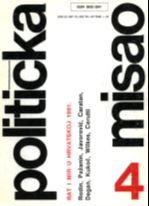Švedska politika i parlamentarni izbori 1991.
Swedish Politics and the Parliamentary Elections of 1991
Author(s): Štefica Deren-AntoljakSubject(s): Politics, Electoral systems, Transformation Period (1990 - 2010)
Published by: Fakultet političkih znanosti u Zagrebu
Keywords: 1991; Sweeden; politics; parliamentary elections;
Summary/Abstract: The specific and stable characteristics of Swedish politics and of Swedish Social Democracy are undergoing profound changes today. The period marked by an expansion of the public sector, centralized collective negotiations based on a historical compromise between work and capital, as well as central planning, has come to an end. Various measures of social policy which in the 1960-ties were giving significant impetus to Swedish economic and social development, have now the very opposite function. The exaggerated care on the part of the state which interferes with almost all aspects of human life from birth to death is experienced by Swedish citizens as a danger threatening to socialize their private lives. This care on the part of the system is so great that it has turned into a counterproductive instrument in many o f its aspects. The changes that Swedish society is undergoing have had their effect upon the results of the elections in autumn of 1991 when the Swedish Social Democrats suffered serious losses in getting only 37,6% of the votes, the party’s lowest election result since 1928. After the elections Swedish Social Democrats decided to withdraw and assume the role of parliamentary opposition after dominating the Swedish political scene for more than 55 years.
Journal: Politička Misao
- Issue Year: XXVIII/1991
- Issue No: 04
- Page Range: 77-98
- Page Count: 22
- Language: Croatian

